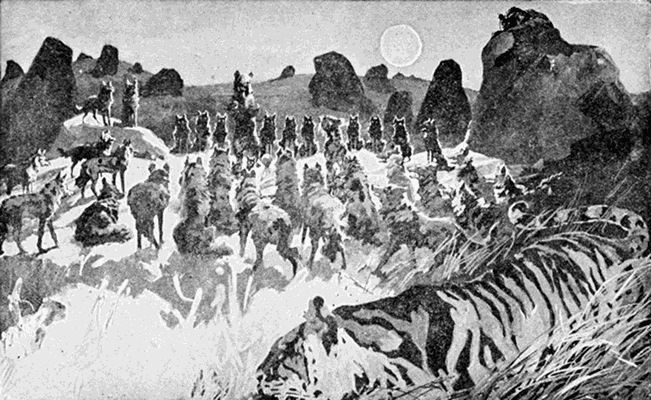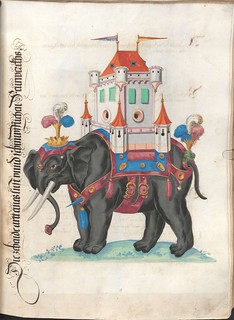Just-So stories have featured in the news lately, as if in an attempt to provoke blogging endeavours about them (if we are too busy with drinking work commitments, readers should feel at liberty to take part in the Write-Your-own-Riddled-Post competition). First there came the Monkey-Fucked-a-Pig theory of hominid origins. Then we had the Evo-Psychologist who declared that he'd never take on an overweight Ph.D student because fatties obviously lack impulse control so couldn't conceivably finish a thesis. He later retracted his tweet as not reflecting his true values and beliefs, and was apparently twittered only due to his lack of impulse control.
Image may be NSFW.
Clik here to view. But evolutionary psychologists are moving on from the Just-So approach to explaining biology. This came after the loss of credibility when it transpired that "The Crab that Played with the Sea" was not a member of the Decapoda, nor even a crustacean, but rather a Tachypleus gigas of the Chelicerate sub-phylum.
But evolutionary psychologists are moving on from the Just-So approach to explaining biology. This came after the loss of credibility when it transpired that "The Crab that Played with the Sea" was not a member of the Decapoda, nor even a crustacean, but rather a Tachypleus gigas of the Chelicerate sub-phylum.
So these days all the cool kids are into computational simulations with interacting agents. In our revised version of the Jungle Book, Mowgli is reared by a tribe of autonomous lupine units following simple non-communicating interactional rules in a multithreaded software environment. Initial reactions were not positive but our market research team assures us that the reading public will eventually come around.
Below, for instance, is an ingenious simulation of a real publication, brought to us by the e-journal PLoS Computational Biology. It is about human sexuality and has therefore featured on 72news infotainment outlets to date -- most reliably Fauxnews -- according to the "Press Coverage" citation index helpfully provided by PLoS journals so that their contributors can assess their impact where it counts.
Specifically, the authors propose that if males choose to exclusively fertilise younger females -- 34 is the cut-off age in their simulation between 100% sex probability and 0% sex probability -- and if one further stipulates mutations which improve breeding fitness in youth at the cost of reduced fitness in later life, this naturally leads to an abrupt drop-off in female fertility, i.e. 'menopause'. Here the definition of 'abrupt drop-off' is stretched to include 'gradual decrease to 20% fertility by age 70', confident in the knowledge that Faux and Daily Fail journalists barely skimmed the abstract, if indeed they even reached the end of the press release. As the Abstract concludes, if one stipulates that the current explanations of menopause are inadequate, then the authors' theory explains that insufficiency!
The key assumption, anyway, is that human males are so sexually discriminating that no female past the age of 34 can find anyone to join her in impregnatory activities. Goats, yes... watermelons, yes... but not older women.
* Hard to be sure because their Table S3 contradicts their Figure 2.
Image may be NSFW.
Clik here to view.
 But evolutionary psychologists are moving on from the Just-So approach to explaining biology. This came after the loss of credibility when it transpired that "The Crab that Played with the Sea" was not a member of the Decapoda, nor even a crustacean, but rather a Tachypleus gigas of the Chelicerate sub-phylum.
But evolutionary psychologists are moving on from the Just-So approach to explaining biology. This came after the loss of credibility when it transpired that "The Crab that Played with the Sea" was not a member of the Decapoda, nor even a crustacean, but rather a Tachypleus gigas of the Chelicerate sub-phylum.So these days all the cool kids are into computational simulations with interacting agents. In our revised version of the Jungle Book, Mowgli is reared by a tribe of autonomous lupine units following simple non-communicating interactional rules in a multithreaded software environment. Initial reactions were not positive but our market research team assures us that the reading public will eventually come around.
Below, for instance, is an ingenious simulation of a real publication, brought to us by the e-journal PLoS Computational Biology. It is about human sexuality and has therefore featured on 72
Specifically, the authors propose that if males choose to exclusively fertilise younger females -- 34 is the cut-off age in their simulation between 100% sex probability and 0% sex probability -- and if one further stipulates mutations which improve breeding fitness in youth at the cost of reduced fitness in later life, this naturally leads to an abrupt drop-off in female fertility, i.e. 'menopause'. Here the definition of 'abrupt drop-off' is stretched to include 'gradual decrease to 20% fertility by age 70', confident in the knowledge that Faux and Daily Fail journalists barely skimmed the abstract, if indeed they even reached the end of the press release. As the Abstract concludes, if one stipulates that the current explanations of menopause are inadequate, then the authors' theory explains that insufficiency!
Menopausal elephant with hot flushes, taking
out her irrational anger on a column of letters
Other species in which females lose fertility before the end of their life expectancy include nellyphants and orcas (also Takahe). Presumably this is because male nellypants and orcas insist on fertilising only younger mates. A corollary of the model is that in species in which females have agency and can choose which males they will accept as sperm donors, judging by their vigour and performance, males will evolve to undergo an abrupt semenopause after peak vigour but before the end of life expectancy. Biologists have been sadly amiss in failing to report this phenomenon. Morton et al. do not seem to have simulated the possibility.*out her irrational anger on a column of letters
The key assumption, anyway, is that human males are so sexually discriminating that no female past the age of 34 can find anyone to join her in impregnatory activities. Goats, yes... watermelons, yes... but not older women.
* Hard to be sure because their Table S3 contradicts their Figure 2.



